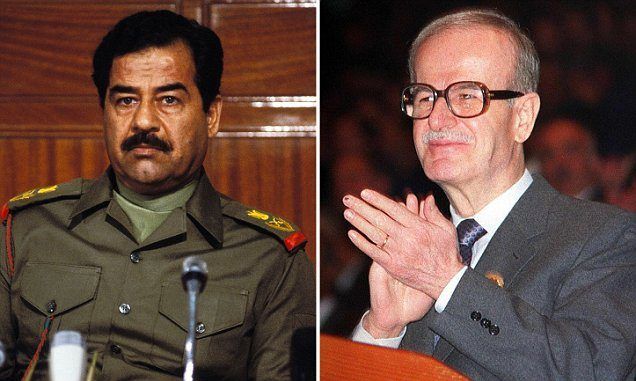
A secret 1983 CIA intelligence report suggested that the US should encourage Saddam Hussein to attack Syria to secure Iraq’s oil pipeline
Hafez al-Assad had closed Iraq’s oil pipeline and as a result had a ‘hammerlock’ on US interests in both Lebanon and in the Gulf
The report by ex- CIA official Graham Fuller, said that America should consider ‘urging Iraq to take the war to Syria’, noting that Saddam was ‘fighting for his life’ in the Iran-Iraq war.

BYPASS THE CENSORS
Sign up to get unfiltered news delivered straight to your inbox.
You can unsubscribe any time. By subscribing you agree to our Terms of Use
The Mail Online reports:
With that being the case, he said the US should consider ‘sharply escalating the pressures against Assad’ from three border states hostile to Syria – Iraq, Israel and Turkey.
Faced with ‘three belligerent fronts’, Assad would probably be forced to abandon his closure of the pipeline, the report claimed.
It hoped it could convince Iraq to co-operate as the closure of the pipeline had brought the country ‘to its financial knees’, impelling it towards dangerous internationalization of the war in the Gulf.
It noted that Iraq might not ‘readily wish’ another campaign but said Syria was already fighting a one-front war in Lebanon and could ‘ill-afford to broaden’ its conflict.
It also said Syria was struggling to keep control over a population that detested the Assad regime.
It went on to say Iraq had enough military airpower to devote up to one half of its air force against Syria.
By demanding the reopening of the pipeline, Iraq would have the support of ‘virtually every Arab state, except Libya’, the report said.
The report added that if the US wanted to ‘rein in Syria’ it needed to do so by showing ‘real muscle’ and highlighted the need to strike a ‘sharp blow’ to Syria’s prestige.
Elsewhere, the report stated that Israel should ‘welcome the chance to humble Assad’ by raising tensions among Syria’s Lebanon front without actually going to war. It said Assad was now Israel’s greatest problem, not Iraq.
Lastly, it said that Turkey, angered by Syrian support to Armenian terrorism, to Iraqi Kurds and to Turkish terrorists operating out of northern Syria, had often considered launching unilateral military operations against terrorist camps in northern Syria.
It said the use of all three states was essential to enacting change and forcing Assad to back down.
Bringing in Iraq, it said, was the most challenging aspect of the plan.
To do so could only be done by a ‘reorientation of US policy towards Iraq’ and might include ‘more active US participation in supplying high-tech items’ to Iraq’s modernization efforts.
It concluded by saying that the US might need to give more support to Iraq in the war against Iran.
The Iraq-Iran war started on September 22, 1980 and did not end for eight years.


Zionist International Bankers = CIA ..Bullies , war dogs , barbarians , scum !